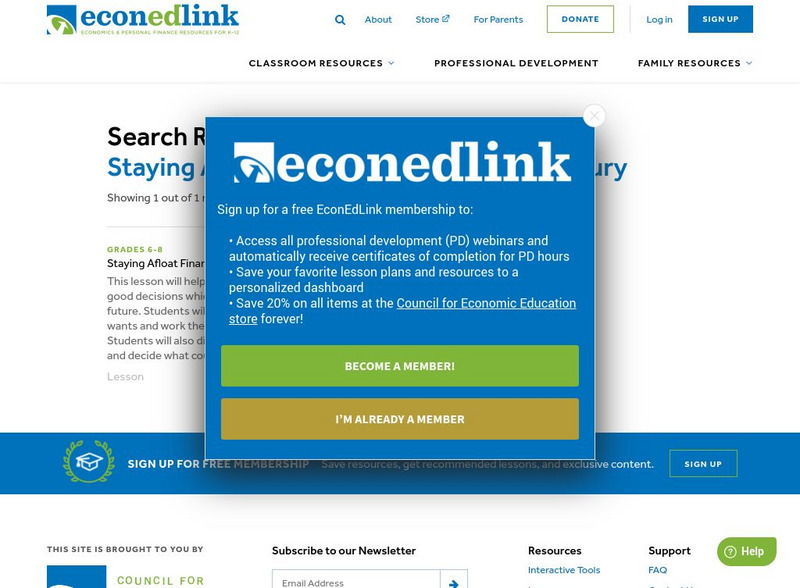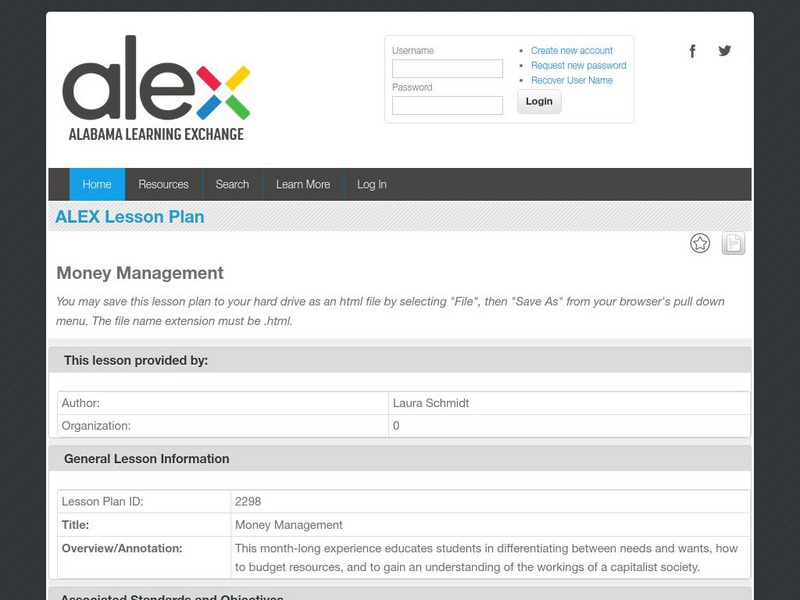Council for Economic Education
Econ Ed Link: Staying Afloat Financially in the 21st Century
This instructional activity will help young scholars identify how to make good decisions which will help them financially in the future. Students will identify how to take their own wants and work them into a form of a personal budget....
Alabama Learning Exchange
Alex: That's All I Have to Spend for a Whole Month?
As a part of the study of personal economics, students will research a career, costs of rent, insurance, food, transportation, etc. and prepare a monthly budget based on their research.
Council for Economic Education
Econ Ed Link: How Long Is Your Life?
High school students have rarely been asked to look at their future beyond where they will be going to college or what job they think they will have. This lesson asks you to think in a long-term perspective. By using a timeline,...
Council for Economic Education
Econ Ed Link: The Role of Gov. National Debt v. Deficit
Using the website federalbudget.com, students research information about the federal budget. Includes questions and links to other budget websites.
PBS
Pbs Learning Media: The Game: Decisions on Deadline
This lesson explores Decisions On Deadline, a free, fun, and fast-paced browser and tablet-based game where players take on the role of journalists running down stories, working against time and a limited budget while navigating a string...
Federal Reserve Bank
Federal Reserve Bank of St. Louis: Less Than Zero [Pdf]
This lesson plan accompanies a story by Stuart J. Murphy called Less Than Zero and teaches students about how to manage their money by saving it and setting goals for themselves.
Council for Economic Education
Econ Ed Link: Money Doesn't Grow on Trees
This lesson plan helps students distinguish between earned and unearned income by identifying methods for getting money.
University Corporation for Atmospheric Research
Ucar: Energy Balance & Greenhouse Effect Teaching Box
This teaching box will help your students understand how conservation of energy determines the average temperature of a planet, including Earth. These activities also illustrate how the greenhouse effect prevents our home planet from...
Practical Money Skills
Practical Money Skills: Lessons: College
Ten financial literacy lesson plans allow college students to build on their skills and cover topics such as budgeting, living on your own, managing credit cards, cars and loans, and saving and investing.
Scholastic
Scholastic: Plan, Save, Succeed! Achieving Financial Literacy Goals
Young scholars will understand how a budget is created and how it can support good financial decision-making. They will begin to consider the role that saving plays in financial planning.
Practical Money Skills
Practical Money Skills: Lessons: Special Needs
Ten customizable financial lessons designed for special needs students.
Save And Invest
Finra Investor Education Foundation: The Emergency Fund
This lesson plan teaches students the importance of being financially prepared for unexpected expenses.
Council for Economic Education
Econ Ed Link: The Role of Government: The Federal Government and Fiscal Policy
Students will visit "A Citizen's Guide to the Federal Budget" and use the federal government website to obtain information which will help them understand basic information about the budget of the United States Government for the current...
Alabama Learning Exchange
Alex: Let's Move to College
A lesson that teaches students how to prepare and stick to a budget as they prepare to head off to college and leave home.
Khan Academy
Khan Academy: Lesson Summary: The Money Market
In this activity summary review and remind yourself of the key terms and graphs related to the money market.Learners will learn about budget deficits, and specifically, the national debt. This resource is designed as a review for the AP...
Council for Economic Education
Econ Ed Link: President Obama's Allowance
In this instructional activity, students will identify different expenses in the US budget and will decide on the order of importance for different expenses.
Alabama Learning Exchange
Alex: I Owe, I Owe, So Off to Work I Go!
Students often attend college and are faced with the mounting debt incurred from student loans. This lesson plan will guide through calculating repayment for students loans, preparing a monthly budget, and researching options for...
Alabama Learning Exchange
Alex: Wild Water Adventure
Students will learn how a system of equations can be used to find the best use of information to make decisions in real-world situations.Students will work in groups of 3s or 4s to develop a system for the best buy on tickets at a water...
Other
Tonya Skinner Business Ed Lesson Plans: Grocery Shopping
This personal site provides a student activity that allows learners to plan a class party while organizing the budget details in a spreadsheet program. Learners will demonstrate computer skills in inputting data, formatting data, and...
Climate Literacy
Clean: Earth's Albedo
This engaging activity introduces students to the concept of albedo and how it relates to Earth's energy balance. They measure the albedo using maps, data tables, and a shaker filled with popcorn kernels. Then, they estimate the Earth's...
Alabama Learning Exchange
Alex: Money Management
This month-long experience educates students in differentiating between needs and wants, how to budget resources, and to gain an understanding of the workings of a capitalist society.
Council for Economic Education
Econ Ed Link: A Penny Saved Is a Penny at 4.7% Earned
This is a lesson from EconEdLink where students learn about saving money. Includes activities and materials.
Alabama Learning Exchange
Alex: Dream Vacation
This unit teaches students to plan a trip with an itinerary, remain within a budget, and work cooperatively. It is a technology-based project that combines a study of mathematics, economics, geography, and social studies.
Alabama Learning Exchange
Alex: A Scents Able Solution
Students will use a variety of math operations to create a flower bouquet within a budget. This lesson plan was created by exemplary Alabama Math Teachers through the AMSTI project.














